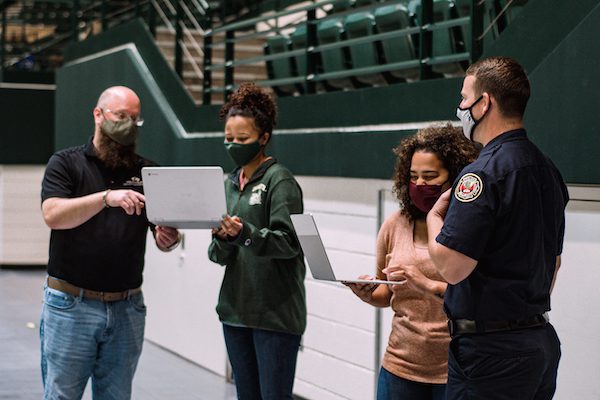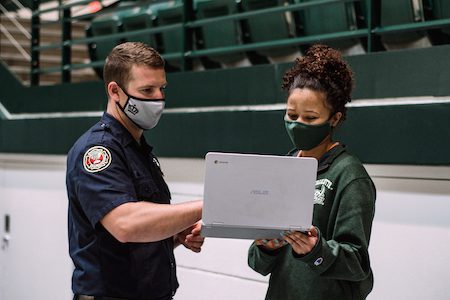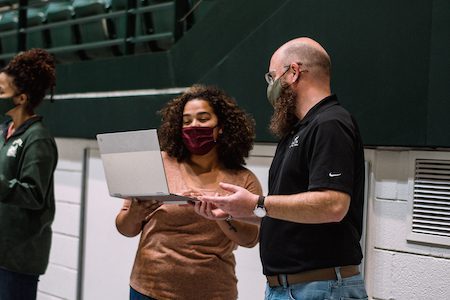Get to know: Lauren Hairston ‘21 and Darien Woods ‘21 MPH
 |
| Darien Woods (second from right) and Lauren Hairston (second from left) confer with Emergency Preparedness Coordinator Kevin Martin (left) and firefighter David Hodnett during an on-campus COVID-19 vaccine clinic. |
Every academic year, the Office of Emergency Management (OEM) welcomes undergraduate and graduate students as interns and assistants. Many are studying public administration, political science, fire and safety engineering technology, or criminal justice. This year, however, both students were studying public health.
Since fall 2020, Darien Woods and Lauren Hairston have supported OEM and the University’s COVID-19 response.
“As the world recovers from this historic pandemic, the fields of emergency management and public health are more closely aligned than ever before,” said Kevin Martin, emergency preparedness coordinator, who supervises the student employees. “I hope our student interns have gained a better understanding of the complexities inherent in the field of emergency management and can use that knowledge to further the goals of public health out in the world.”
Woods, from Belleville, Wisconsin, received her Master of Public Health with a concentration in epidemiology and a certification in emergency management during spring commencement ceremonies. She also holds a bachelor’s degree in kinesiology and health from Iowa State University.
Hairston, a proud Charlotte native, graduated in May with her Bachelor of Science in Public Health with a minor in biology.
Get to know both recent UNC Charlotte alumnae in the Q&A below.
 |
| Lauren Hairston (right) and David Hodnett (left) |
Why were you interested in an internship with the Office of Emergency Management?
Lauren Hairston: My first experience with the field of emergency management was through a public health elective I took through the geography department my junior year. This course explored the issue of climate change through the lens of emergency management and public health, and I still think about my experiences in that classroom to this day. I was in this particular classroom when the shooting happened on campus in April 2019, and I will never forget how quickly a fellow student and employee of the Office of Emergency Management was quick to take action and use his expertise to protect his peers. When I learned that I had to choose an organization to complete an internship with during my senior year, I immediately began a search for contact information for the Office of Emergency Management on campus. Emergency management was an area that I was definitely curious about, and I wanted to use my internship as an opportunity to learn more about the sort of things that they do for our college campus.
Darien Woods: With the COVID-19 pandemic emerging right as I was searching for internships in the spring of 2020, I knew this would be an opportunity to merge my interest in public health emergency preparedness and infection control to assist an agency with responding to the pandemic. When I reached out to Kevin Martin inquiring about internships available with the Office of Emergency Management, I was surprised they were equally excited for the ability to incorporate a public health student into their response.
Can you describe some of your duties over the past year and how were they influenced by the pandemic?
LH: Over the past year, Darien and I worked together to update the University’s pandemic plan with the most current information regarding COVID and our ongoing response. I also took quite a bit of online FEMA courses to gain a solid foundation of the field of emergency management and what frameworks encompass it. I was originally supposed to complete a project surrounding the April 2019 shooting, but that was altered due to the COVID situation, which is a good representation of the unexpected nature of this field.
DW: I helped compile and track daily statistics related to COVID-19. I assisted in the redevelopment of the pandemic response plan for the UNC Charlotte Emergency Operation Plan. Additionally, I tracked current trends of the COVID-19 pandemic to help the UNC Charlotte campus response.
What is your most memorable experience working in OEM?
LH: The entirety of fall 2020 and spring 2021 was a culmination of memorable experiences that I’m not sure I could ever forget, even if I tried. Although if I had to pick something, I would say that working with such a cohesive team during such a turbulent time was the most significant experience. A major objective of our BSPH program is to learn to communicate in teams and being able to observe this team in action is the best example of a harmonious team that I’ve ever seen. With the unpredictable nature of this field, I’m honored to have had the opportunity to learn from this group.
DW: I would consider the whole opportunity to be a part of the COVID-19 response as my most memorable experience. Working with OEM, I was fortunate to gain experience in epidemiological surveillance, data management and plan development.
 |
| Darien Woods (left) and Kevin Martin (right) |
What is the biggest lesson you will take away from your internship?
LH: My biggest lesson that I will take away from my internship is to never be afraid to take a chance on something new! As a public health student, emergency management is not a field that’s common knowledge and I happened to stumble upon it. It was definitely scary to take a chance on something I barely knew anything about, but I did and I’m grateful it paid off in the way it did.
DW: The main takeaway from this experience is although planning is essential to emergency management functions and operations, working in this field requires flexibility and maximizing the opportunities to establish relationships. As we have seen with responding to this pandemic, there isn’t just one agency responsible for effective response; instead, it’s a network of stakeholders and entities.
What are your plans now that you’ve graduated? Has your internship influenced your future career goals at all?
LH: I will be starting pharmacy school at UNC Chapel Hill in the fall, and I’m really excited to start this new journey! This internship experience has encouraged me to pursue a residency after my completion of the doctorate program and pursue emergency medicine or ambulatory care and hopefully have some sort of role in emergency response.
DW: I plan to continue working with OEM as I explore career opportunities focused on public health emergency preparedness and disaster epidemiology. The internship with OEM has greatly expanded my reach in future careers since there is a great opportunity for public health to be incorporated into emergency management.
Finally, why did you choose UNC Charlotte? And what would you want future students to know about Niner Nation and your experience?
LH: I chose UNC Charlotte because in a place that is already home, I couldn’t imagine not being able to spend the most pivotal years of my life at this institution. There’s something special in the sense of familiarity that I felt with UNC Charlotte and I feel as if that connection (among all of the other resources here) allowed me to succeed. I want future students to know that Niner Nation is a family, and although college is a difficult journey, I have had the time of my life here and I am forever grateful to be a 49er. My biggest piece of advice to all of the future 49ers is to just enjoy the ride, you’re in great hands!
DW: I chose UNC Charlotte because of the location and program. Moving from the Midwest, I wanted to ensure my move for graduate school was somewhere that gave me an educational experience and a social/community experience. For a graduate student, Niner Nation has allowed me to develop and build relationships in my field of study. The collaborations with the community are available, and I encourage students to look at opportunities to develop their network while in school. The connections and relationships I built will help me exceed in my career.
Interview by Christy Jackson
Photography by Jordan Estabrook